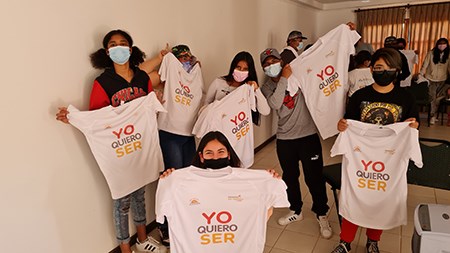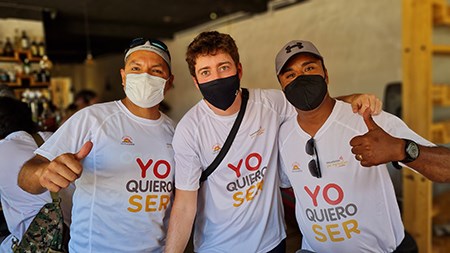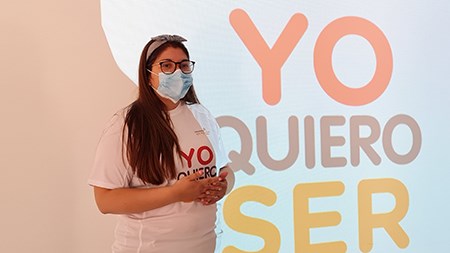Win-win-win: Antofagasta’s inaugural volunteering programme
1st August 2022
According to a McKinsey report published in the midst of the Covid-19 pandemic, while a company’s executives may be forgiven for focusing solely on corporate priorities and letting other intangibles fall by the wayside in an attempt to weather the storm, it is actually in times of crisis when employees need to find purpose in order to better face and navigate uncertainties.
In fact, the report shows that those who find individual purpose at work register levels of wellbeing that are five times higher, and are four times more likely to report higher engagement levels, than those who do not feel they have purpose.
While the stress caused by the health emergency may not have been the direct reason for doing so, mid-2020 Human Resources and Public Affairs – departments that have a direct relation with employees and communities – agreed to look into this and eventually launched a pilot programme. Along the way, everyone involved would be surprised by the lessons learned as well as the benefits reaped not only by the beneficiaries but by the company and the employees themselves.
“It started with a phone call to Andrés [Morán, Antofagasta’s Public Affairs Manager], and we identified an opportunity to link the Group’s purpose of developing mining for a better future with our workers’ interests and to take advantage of the Group’s collective intelligence,” says Gerda Bianchini, Human Resources Compensation Manager.
In the style of the Group’s well-established Somos Choapa community engagement programme, employees participated in forums and answered surveys to brainstorm ideas on the different volunteering options. Different areas were identified in which workers were interested in contributing: education, environment, community strengthening, housing and construction, and sports and recreation. Priority groups identified to focus on included children and adolescents, senior citizens, those on low incomes and the homeless.
The future programmes’ baseline characteristics were also defined: assistance should not be in the form of aid; it must be sustainable; and it must be replicable with a short turnaround time for implementation. It was also agreed that there needed to be a connection between the benefitted groups and the skills of participating volunteers, and that the assistance should be relevant to the host communities. Workshops were held for each of the Group’s four mining operations and the company’s head office to co-design a specific pilot project for each of them.
Implementing the process was not easy and required a significant amount of organisational resilience in the middle of the pandemic, according to Bianchini. Participants did not know each other, the organising had to be done online and there was organisational learning in how to administer an out-of-the-ordinary process. Volunteers developed skills including project methodology implementation and planning, defining and developing roles, and making executive presentations.
“In this first stage of volunteering, very important values emerged, such as collaboration, real co-designing, openness to listen to others and the collective resolution of complex problems. We now want to make this collaborative construction process available to other Group processes,” says Andrés Morán.
Bianchini wholeheartedly supported the new process: “I’m convinced we can model this prototype of working between different areas. Human Resources could have done it alone, and so could Public Affairs, but I promise you it would not have turned out as well as it did. This model could be extended to other challenging processes within the organisation and guide inter-departmental work for use in other transversal projects.”
In working to support and benefit their respective surrounding communities, employees were able to generate networks and collaborate with co-workers who they normally would not know. People from completely different areas joined in a common purpose, came to know each other and can now better interact in their own processes within the company. And along the way they received training that facilitates better job performance.
Besides the increased employee commitment, which in turn drives retention, the volunteers’ work helps Antofagasta to improve its reputation with stakeholders and attract new talent in applicants that are looking to excel in an organisation that is attentive to issues beyond its financial results.
“I was motivated by wanting to contribute to something beyond work. There are many ways to leave a mark on the world and one of the most powerful is when you help another person,” says Natalia Contreras, Mechanical Maintenance Supervisor at Antucoya.
In the end, a total of 70 Antofagasta employees volunteered their time and effort to support 261 beneficiaries at our operating and administrative centres:
Los Pelambres: Apoyándote en tu futuro (“Supporting you in your future”) involved working with adolescents at the Polivalente de Salamanca School to broaden their horizons about the opportunities that were open to them in higher education.
Antucoya: Yo quiero ser (“I want to be”) focused on contributing to social mobility for at-risk youngsters in the city of Antofagasta, via the delivery of practical tools and skills development that allowed them to design their life project based on their passions, capacities and vocation.



Centinela: Activando vidas (“Activating lives”) entailed working with senior citizens at the San José senior centre to improve their quality of life, with a strong sense of solidarity, companionship and a collaborative spirit.
Zaldívar: Actívate con Zaldívar (“Activate with Zaldívar”) worked with children and their families at the Blanca Nieves day care centre in the city of Antofagasta, introducing educational and recreational activities that aimed to help improve their community’s quality of life.
Head office: Apoyo transversal a Fundación Las Creches (“Cross-sectional support for the Las Creches Foundation”) helped socially vulnerable young and adolescent girls’ development and wellbeing at the Las Creches girls shelter in Santiago, by supporting them in various areas, ranging from education and training to providing them with materials and infrastructure.
Moving forward, Antofagasta will call for more volunteers to sustain ongoing projects and for the co-design of new ones.
